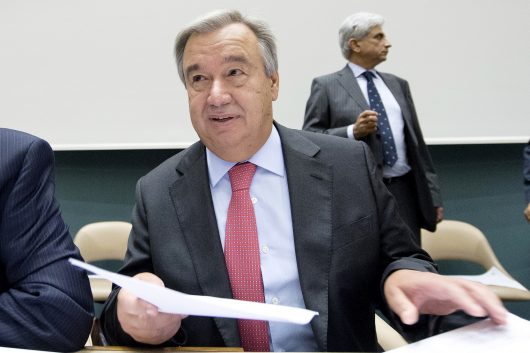António Guterres Named U.N. Secretary-General

In early October, the 15 ambassadors that make up the U.N.’s Security Council were presented with the challenging decision of choosing a new secretary-general. The vote was characterized as the most important decision from the U.N. this year. In the end, António Guterres, the former socialist prime minister of Portugal, was nominated as the new U.N. secretary-general.
Guterres was favored for the position for many months leading up to the actual vote. He accepted the nomination from Lisbon after the Council’s decision and did so with “gratitude and humility.”
He will replace current Secretary-General Ban Ki-moon in January. Historically, the Security Council has been polarized in their decision-making, so the consensual conclusion to choose Guterres was met with his resounding agreement. Guterres described the decision as an “exemplary process of transparency and openness.”
The decision to choose António Guterres ignored the Council’s traditions of rotating the presidency based on region. The only region that hasn’t held the presidency is Eastern Europe, which is one reason why Danilo Turk, a former Slovenian president, and Irina Bokova, a Bulgarian director-general of the United Nations Educational, Scientific and Cultural Organization (UNESCO), finished closely behind Guterres in the vote.
The Council also ignored external pressures to elect a woman secretary-general, despite seven of the 13 candidates begin female. Well aware of this, Guterres has pledged to exercise gender equity as he moves forward with his new position.
After acting as the prime minister of Portugal from 1995 to 2002, Guterres was elected to serve as the head of the U.N.’s High Commission for Refugees. While serving in this position, Guterres repeatedly called for humanitarian action from countries with appropriate resources.
In particular, after U.N. agencies failed to meet funding goals that would provide humanitarian aid for displaced peoples in Jordan, Lebanon and Turkey, Guterres called for financial commitment from Western countries.
His experience leading a major U.N. institution was looked at as a huge strength in the voting process. He has promised to demonstrate “the humility that is needed to serve especially those that are most vulnerable.”
Guterres will have to face many difficult challenges as he moves forward with his new position of leadership, like maintaining and negotiating support from Russia and the U.S. and facing the impacts of the global refugee crisis.
Despite these inevitable challenges, the ambassadors of the Security Council are confident that Guterres will be able to act justly and level-headedly as the new U.N. secretary-general.
– Peyton Jacobsen
Photo: Flickr
